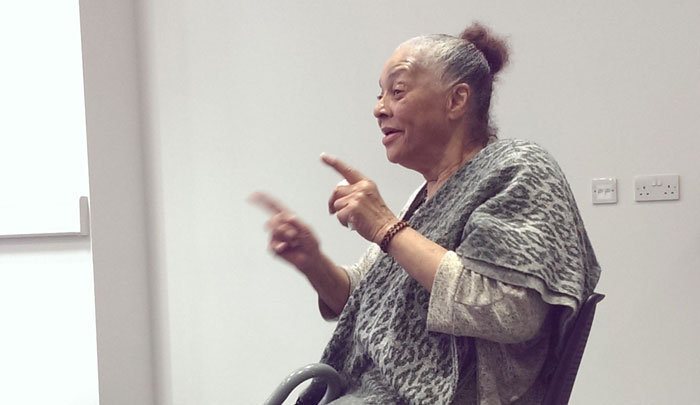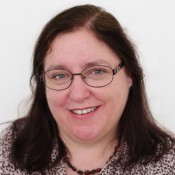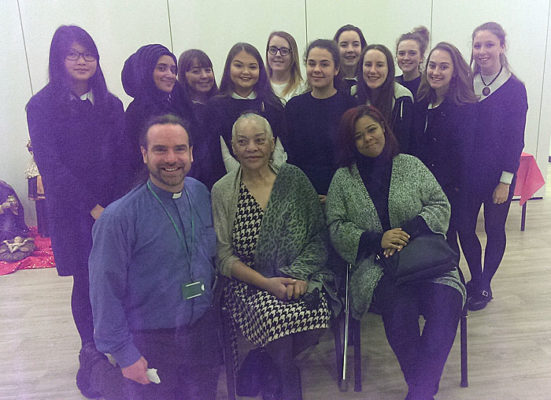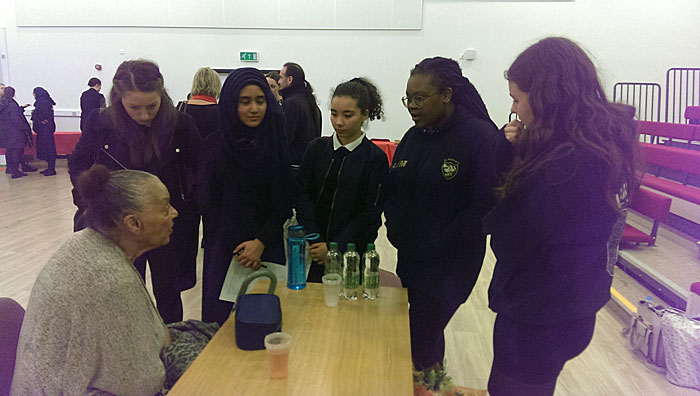The Journey from Outcast to Activist: It Starts With “A Seed in the Heart” | Diana Skelton

“When we got into the room with Dr. Martin Luther King, it was like talking to someone with an aura around him. It was all in his eyes. But did we hold our heads down? No! And we said to him: ‘We want respect.’”
— Jean Stallings
By Diana Skelton
 To mark Human Rights Day on 10 December, ATD member Jean Stallings was the guest of honour at the opening of a special exhibit in London called Journey to Justice. As this exhibit tours schools and community centres in different parts of the country, veterans of social justice struggles recount human rights history to young people, who draw inspiration to take action themselves.
To mark Human Rights Day on 10 December, ATD member Jean Stallings was the guest of honour at the opening of a special exhibit in London called Journey to Justice. As this exhibit tours schools and community centres in different parts of the country, veterans of social justice struggles recount human rights history to young people, who draw inspiration to take action themselves.
The history that Jean told them is about an aspect of the civil rights movement that is not well known. In the 1960s, when Jean was a young single mother, there was no place for unmarried mothers in that movement. She was refused a membership card by the NAACP. The issues that single mothers cared about were ignored. On top of that, Jean did not see herself as an activist. It was one day when she was at a second-hand shop to find clothing for her children that a woman invited her to a meeting about rights for mothers. Jean says:
“I hesitated. I was terrified to walk through the door into that meeting with my babies in their stroller. But the other women reached out to me that day. They planted a seed in my heart that began my journey to activism. At that time, there was no recognition for single mothers as human beings. You were outcast because of the colour of your skin, and also as a single mother. We were stigmatized by case workers who would inspect our homes looking for a trace of a man, trying to prove we were lying about being single, and turning our homes upside-down in front of our children. Our goal was to let people know that we wanted to be treated with dignity. In the welfare rights movement, other women trained me. I found my own voice. And we cared for each other, even in hardship. In your worst moments, what you need most is someone who will look into your eyes without disgust.”
In 1968, Jean was one of a small handful of women chosen from across the country to meet with Dr. Martin Luther King. Again, she says how frightening this was: “It was my first time taking an airplane. I didn’t know if I would be properly dressed. Someone gave me shoes—proper shoes—to wear when we would meet Dr. King. But when we got into the room, it was like talking to someone with an aura around him. It was all in his eyes. But did we hold our heads down? No! They didn’t call national welfare rights activists ‘women’; they called us ‘warriors’—’mother warriors.’ And we said to him: ‘We want recognition, we want respect. And we want to be a part of your movement, but you will have to include us in your talks. You have to tell people the challenges we face, because mothers are the bearers of the next generation.’”
In 1999, Jean’s journey to activism took her to ATD Fourth World where she has spent years as an advocate at the United Nations, and also in low-income communities reaching out to and mentoring people who are struggling. Looking back at our journey together, with members of ATD across North America, Africa, and elsewhere, I see three key threads that nourish the seed of activism in our hearts:
- We thirst for exploration and discovery of all the people and communities we do not know yet, beginning with those who have been the most harshly oppressed by poverty. Our aim is to develop more connectedness among people, whoever they are, from those we might see every day but struggle to speak with, to policy makers who deserve to hear from people who have felt outcast.
- We are vigorous in seeking to learn and understand more about each person, and about the world as a whole. In this diverse world, our communities are different and so are the challenges that each of us must overcome. Each of us has a different way of seeing and comprehending the world. We will always need each other to widen our collective understanding.
- We regularly bring together people from different countries who each feel like outcasts in the worst situations of poverty, but who each have something important to teach others. This kind of international consultation among experts is usually reserved for doctors or scientists. However, we invest enormous energy in such gatherings as the best way to sharpen our collective expertise about how to overcome poverty and exclusion. This is also one way that we begin to overcome prejudice. There is prejudice everywhere—but it takes many different forms. And when a person has grown up always being treated like dirt, it is very hard to imagine that things could be different. As Jean Stallings said, it can be terrifying to walk through a door to meet strangers and take part in a meeting. Meeting people from other parts of the world shows each of us how very different the prejudices are in each place. And this can help to open doors in the mind of a person who did not dare imagine that they deserve to be treated with dignity and have an intelligent contribution to make.
So many of our members have been finding their unique voice, as Jean Stallings said she did once the seed of activism was planted in her heart. And as a movement, we have been finding our collective voice where each person has the chance to develop her or his thinking in dialogue with others.
About the injustices that people around the world face today, Jean said: “We’re in trouble! But we can never give up. We have to cast away our doubt, and our fear, and our anger. I get discouraged when I see evil. But will I let an evil spirit overtake mine? Can I let it make me lose the purpose of my life? The answer is no. We can never let that happen, and we will never give up.”



